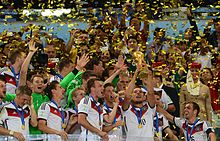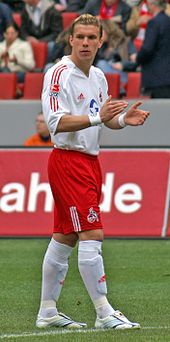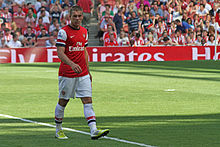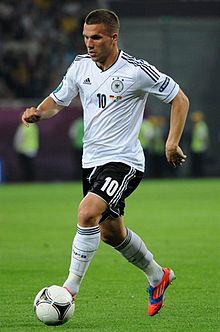Lukas Podolski
![]()
This article is about the football player. For the cyclist see Łukasz Podolski (cyclist).
Lukas Josef Podolski (born 4 June 1985 in Gliwice, Poland as Łukasz Józef Podolski) is a German footballer signed to Turkish Süper Liga side Antalyaspor.
Born as a citizen of the People's Republic of Poland, Podolski began his professional career in 2003 with his youth club 1. FC Köln, for whom he also played as an international in the 2nd Bundesliga for one season. After the club was relegated again, he moved to FC Bayern Munich in 2006, where he became German champion and DFB Cup winner in 2008. In 2009, he moved back to Cologne, where he was captain for a time and finally became a "club icon" until he joined Arsenal FC in the English Premier League after their relegation in 2012, where he won the FA Cup and the English Super Cup in 2014. In the meantime, he moved to Inter Milan in the Italian Serie A for six months. From 2015 to 2017, Podolski was under contract with Galatasaray Istanbul in the Turkish Süper Lig and won the Turkish Cup in 2016, his third national cup victory. From 2017 until early 2020, he played in the Japanese J1 League with Vissel Kōbe, with whom he won the Japanese Cup in 2019. Since January 2020, he has been under contract with Turkish first division club Antalyaspor.
With the German national team, Podolski took part in every major tournament from the 2004 European Championship up to and including the 2016 European Championship, playing 130 international matches and scoring 49 goals. This makes him the third most successful goalscorer and the player with the third most caps in DFB history. He was world champion with the national team at the 2014 World Cup, second at the 2008 European Championship and third at both the 2006 and 2010 World Cups.
Live
Lukas Podolski was born into a middle-class Catholic family in Gliwice, Poland, the son of German-born former footballer Waldemar Podolski and former handball player Krystyna Podolska, who played for the Polish national team, and lived in the Sośnica district. In 1987, his parents moved him and his sister, five years his senior, to West Germany and settled in Bergheim, not far from Cologne. From 1995 to 2001 he attended the Erich-Kästner-Hauptschule in Bergheim; after graduating from secondary school (type 10 A), he also acquired the Fachoberschulreife at the Nell-Breuning-Berufskolleg in Frechen in 2003. Afterwards he did his civilian service at the Olympiastützpunkt Rheinland in Cologne.
On 18 April 2011, he married his girlfriend of many years, a native of Poland, with whom he has a son (* 2008) and a daughter (* 2016). The church wedding took place on 11 June 2011 in Kamionna, a village in the municipality of Łochów in Mazowieckie Voivodeship.
Career
Associations
1st FC Cologne
Lukas Podolski began his football career in 1991 with Jugend 07 Bergheim and moved to the D-youth team of 1. FC Köln in 1995. As a C-youth player, he was coached by Willi Breuer. In the 2003/04 season, at the age of 18, he played in the A-Junioren Bundesliga for the first eight match days and scored eight goals. He was then invited by Marcel Koller, coach of 1. FC Köln, to train with the professionals. On 11 November 2003, he signed his first professional contract and made his professional debut eleven days later. Three matchdays later, he scored his first Bundesliga goal in a 1-1 draw against Hansa Rostock. In his debut season, Podolski scored 10 goals in 19 first division games, a feat no 18-year-old had achieved in the Bundesliga's 41-year existence. However, as he was the team's only successful goal scorer, 1. FC Köln were relegated to the bottom of the table with 23 points. The following year, he became top scorer in the 2nd Bundesliga with 24 goals in 30 games. 1. FC Köln finished first in the table and was promoted directly back to the Bundesliga.
In the 2005/06 season, Podolski again managed a double-digit goal haul, but his twelve goals for the season were once again not enough for Cologne to stay in the league. The striker cited the renewed relegation to the 2nd Bundesliga as the main reason for his departure from Cologne.
FC Bayern Munich
On 10 July 2006, Podolski moved to FC Bayern Munich, where he signed a contract until 2010. There he could not establish himself permanently, he did not get beyond the status of a supplementary player. In the 2006/07 season, he scored only four goals in 22 games for Bayern and was voted the "relegated player of the 2006/07 season" in a survey of 268 Bundesliga players by the magazine Kicker in early June 2007. The 2007/08 season was similar with 25 appearances and five goals, but he still became German champion and cup winner with Bayern.
Podolski's former supporter Jürgen Klinsmann became Bayern's new coach for the 2008/09 season. Klinsmann was against Podolski leaving the club, but Podolski remained a substitute. After playing for the full time only twice in eleven appearances in the first half of the season, his return to 1. FC Köln after the season was negotiated during the winter break. In the second half of the season, Podolski made seven more appearances until Klinsmann was sacked after Matchday 29. In the last five games under new coach Jupp Heynckes, Podolski put in the best performance of his Munich tenure, at least briefly, with two goals and five assists. In total, he scored six goals in 24 games in his final Bayern season.
Return to Cologne
Podolski returned to 1. FC Köln for the 2009/10 season. His contract ran until the summer of 2013. In order to refinance part of the transfer fee, a welcome match was held against FC Bayern on 24 July, which was broadcast live by RTL and ended 0:2. In addition, the transfer fee was partially financed by an investor. However, Podolski's goal haul in his first season at FC fell far short of expectations; after scoring his first goal on matchday five, he did not score again until matchday 25 against his former club Bayern Munich.
Despite tearing his lateral ligaments before the winter break, Podolski enjoyed a more successful 2010/11 season, scoring 13 goals in 32 games, making him the ninth-highest scorer in the league. In the second half of the season, he also became the new team captain of 1. FC Köln under coach Frank Schaefer. With 44 points and tenth place, the team showed an upward trend that was to continue under new Norwegian coach Ståle Solbakken in the 2011/12 season. However, Solbakken first made Pedro Geromel, who was the same age as Podolski, the new captain. Podolski himself played a successful season and continued his performances of earlier years with 18 goals as the fourth best scorer in the Bundesliga. He scored his 50th Bundesliga goal in the match against Hannover 96 on 11 March 2011. Nevertheless, the team got deeper and deeper into the relegation battle in the second half of the season and ended up in a direct relegation place on the last matchday, after a 0:4 against Bayern Munich. After four years in the Bundesliga, FC was once again relegated to the 2nd division and Podolski left his youth club for the second time after his third Bundesliga relegation with 1. FC Köln.
Arsenal FC
Podolski moved to Arsenal FC in the English Premier League for the 2012/13 season. He played his first competitive match on 18 August 2012, the first matchday, against AFC Sunderland (0-0); he was replaced by Olivier Giroud in the 64th minute of the match. In his third Premier League match on 2 September 2012, he scored his first goal for Arsenal in a 2-0 win over Liverpool FC. He scored for the first time in the 2012/13 UEFA Champions League on 18 September 2012 in a 2-1 win over HSC Montpellier.
He was one of the top ten most popular footballers in the UK in 2012, based on the number of jerseys sold.
Inter Milan
On 5 January 2015, Podolski moved to Inter Milan in the Italian Serie A on loan until the end of the season. He made his debut a day later, coming on as a 54th-minute substitute for Zdravko Kuzmanović in the 1-1 draw with Juventus Torino in the Derby d'Italia. He was not re-nominated for Milan's Europa League squad in early February 2015. Of newly arrived players who had already played for another club in the Champions League this season, each club was allowed to re-nominate a maximum of one player and coach Roberto Mancini opted for Xherdan Shaqiri, also signed from FC Bayern Munich during the winter break. Podolski scored his first goal for Inter on April 28, matchday 33, when he netted the 2-1 winner against Udinese Calcio in the 65th minute of the game. He has made eight of his 17 league appearances, scoring just one goal.
Galatasaray Istanbul
He was signed by Turkish first division side Galatasaray Istanbul for the 2015/16 season, signing a three-year contract with an option to extend for a further year. He made his first competitive appearance for the club on 8 August 2015, winning the Turkish Super Cup with them in a 1-0 victory over Bursaspor. On his league debut on 15 August 2015 (matchday 1), he scored the 81st-minute goal in the final 2-2 draw away to Sivasspor. On 26 May 2016, he scored the 1-0 winning goal in the cup final and was voted Player of the Match. He started the 2016/17 season again by winning the Supercup (against BeşiktaşIstanbul).
Vissel Kōbe
After the end of the 2016/17 Süper Lig season, Podolski moved to Japan to join Vissel Kōbe in the 2017 J1 League season, which was already at half-time, for a transfer fee of €2.6 million. He scored two goals in his competitive debut on 29 July 2017 in a home match against Ōmiya Ardija. In the last match of the 2019 season, which he finished eighth with Kōbe, Podolski scored three goals in a 4-1 win over relegated Júbilo Iwata. On New Year's Day 2020 at the inaugural sporting event of Tokyo's New National Stadium, Podolski and his team won the Japanese Emperor's Cup for the first time. After that, his contract with the Japanese first division club ended.
Antalyaspor
In January 2020, Podolski returned to the Turkish Süper Lig and signed a contract with Antalyaspor. On 3 June 2021, Antalyaspor said goodbye to Podolski via Twitter without prior personal contact; the contract expired at the end of the season.
National team
Lukas Podolski played for German youth selection teams from 2001 onwards, starting with the U17s.
Regarding the rumours that the Polish Football Association PZPN invited him to play for the Polish national team, but that he refused for financial reasons, he said: "Nobody suggested me to play for Poland when it was still possible. The officials missed the opportune moment."
At the end of May/beginning of June 2004, he took part with the U21s in the European Junior Championship being held in Germany. Already after the preliminary round, in which Podolski was used twice, the German youth was eliminated. But without having played once for the senior national team, Podolski was nominated as the fifth striker for the German squad for the 2004 European Football Championship. Just four days after the last match of the U-21 European Championship, he was invited to the senior team's preparation match against Hungary in Kaiserslautern. In the last quarter of an hour he was substituted, so the decision to play in the German national jersey in the future was finally made. The game was lost with 0:2. At the European Championship in Portugal, he was substituted at half-time in the decisive third preliminary round match, but the game against the Czech Republic was lost - and the senior team was also eliminated early.
After the failure, the rebuilding of the team for the upcoming home World Cup went ahead and Podolski was used regularly in the national team. He made his starting debut against Japan on the team's trip to Asia in late 2004, and scored his first two goals for Germany against Thailand on 21 December. He participated in the 2005 FIFA Confederations Cup in Germany as a regular and scored three goals in four matches. After the tournament, he scored three goals himself and set up the fourth in an international against South Africa. After that, he was a regular in all World Cup preparation matches. At the 2006 World Cup, he played in every match for the German team and scored three goals. The FIFA technical committee subsequently voted him the best young player of the World Cup, ahead of such prominent players as Lionel Messi (Argentina) and Cristiano Ronaldo (Portugal). At the age of 21, he had already scored 16 international goals, something no other player of that age had ever achieved before.
He was again very successful in the European Championship qualifiers from September 2006 to November 2007, scoring eight goals in nine games. He contributed four goals to the 13-0 win over San Marino, Germany's highest ever win in a qualifier. He missed one game after being sent off and suspended for assault in a friendly against Georgia on 7 October 2006. It was the first red card of his professional career. He was then back in the first eleven for the 2008 European Championship. He scored all three of the German team's field goals in Germany's first two games in the group stage - the 2-0 win over Poland on 8 June in Klagenfurt am Wörthersee and the 1-2 loss to Croatia on 12 June at the same venue. He set up both of Bastian Schweinsteiger's goals in the quarter-final against Portugal and the semi-final against Turkey. He was selected by UEFA's expert committee as a member of the 2008 European Championship all-star team the day after Germany's defeat to Spain in the final.
In 2008/09 he again played in nine of the ten qualifiers for the following major tournament. Together with the friendlies during this period, he scored a goal on average in every second international match. On 6 September 2008, Podolski scored his 30th national team goal against Liechtenstein. He was (at the then age of 23 years and 3 months) the youngest German international to have achieved this. Only six players in the world were younger: Pelé, Sven Rydell, Ronaldo, Sándor Kocsis, Stern John and Ferenc Puskás. During Germany's World Cup qualifier against Wales in Cardiff on 1 April 2009, Podolski first engaged in a verbal altercation with Michael Ballack in the 67th minute of the match and then appeared to punch him in the face. Prior to this, Ballack had been loudly giving tactical instructions to the striker. The alleged assault was not sanctioned by the DFB or FIFA, but Podolski voluntarily donated €5,000 to a DFB fair play campaign.
On 6 May 2010, he was called up by national coach Joachim Löw to the squad for the 2010 World Cup. There he scored the first goal in the first group match, but in the second match against Serbia he missed a penalty as the third German international after Uli Hoeneß in 1974 and Uli Stielike in 1982 at a World Cup. In the round of 16, however, he scored the 2:0 against England (final score: 4:1). After the semi-final defeat against the later world champions Spain, he sat out the match for third place: It was the first World Cup match he missed since his first nomination.
In the qualifiers for the 2012 European Championship, he again made nine appearances for Germany, but had his worst goal tally to date with three goals. But all nine games were won. Podolski was then nominated for the 2012 European Championship squad and was again in the starting eleven in the first match. In the preliminary round encounter against Denmark (2-1) on 17 June, he played his 100th international match at the age of 27 years and 13 days. He thus replaced Franz Beckenbauer as Germany's youngest "hundred" and was the youngest player in Europe to reach that number of international appearances until 22 March 2013. (On 22 March 2013, he was succeeded by Sergio Ramos as the youngest European "hundred"). In that match, he scored his 44th international goal to take a 1-0 lead. In addition, he was subsequently voted "Man of the Match" by UEFA. In the quarter-finals, coach Joachim Löw then selected a new formation on the left attacking side with Marco Reus and Podolski had to sit out. He returned to the starting line-up in the semi-finals, but was substituted for Reus at half-time after going 2-0 down, but the tournament exit could not be averted.
In a 4-2 friendly win over Ecuador in Boca Raton on 29 May 2013, Podolski set a new record (since the beginning of timekeeping in football) for the fastest goal scored in an international match by the German national team after just nine seconds with his first of two goals. In doing so, he scored the second-fastest international goal to date behind San Marino's Davide Gualtieri, who took 8.3 seconds against England in 1993. With his 48th goal, he also overtook Jürgen Klinsmann and Rudi Völler to take third place in the national team's "all-time goalscorers list".
On 8 May 2014, he was called up by national coach Joachim Löw to the provisional squad for the 2014 World Cup in Brazil. He played in two preliminary round matches, 53 minutes in total. On 13 July, he became world champion with the national team.
After Miroslav Klose's retirement, he was the player with the most appearances and the most goals among the still active German internationals. Only Klose (137) and Lothar Matthäus (150) have played more international matches and only Klose (71) and Gerd Müller (68) have scored more goals for Germany.
He was again included in the national team squad for the 2016 European Football Championship in France. In the tournament, he was substituted in the round of 16 against Slovakia at the score of 3:0 in the final quarter hour.
On 15 August 2016, Podolski retired from the national team. His farewell took place on 22 March 2017 in a friendly match against England in Dortmund, where he scored the winning goal to make it 1-0 with a long-range strike, which was voted Goal of the Month March 2017 and Goal of the Year 2017 by the viewers of Sportschau.

Podolski (with the trophy) after winning the 2014 World Cup.

Podolski in the jersey of 1. FC Köln (2006)

Podolski in the Arsenal FC shirt (2012)

Podolski in the national team jersey in a match scene during the 2012 European Championship.
Search within the encyclopedia